Ditapis dengan
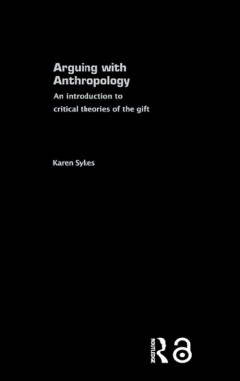
Arguing with anthropology :an introduction to critical theories of the gift
Arguing with Anthropology is a fresh and wholly original guide to key elements in anthropology, which teaches the ability to think, write and argue critically. Using the classic 'question of the gift' as a master-issue for discussion, and drawing on a rich variety of Pacific and global ethnography, it provides a unique course in methods, aims, knowledge, and understanding. The book's highly ori…
- Edisi
- -
- ISBN/ISSN
- 9781134523450
- Deskripsi Fisik
- x, 244p. : ill.
- Judul Seri
- -
- No. Panggil
- 394 SYK a

Information and communications technology :in the 21st century classroom
Are you a student who wants to become an effective teacher in the 21st century? Maybe you are a teacher already? Would you like to learn how to take advantage of educational technologies in order to achieve your pedagogic goals? Nowadays, technology is all around us, but how do we, as teachers, make the best use of it?Technology has entered the classroom and most teachers are not trained in usi…
- Edisi
- -
- ISBN/ISSN
- 9783110401455
- Deskripsi Fisik
- viii, 195p. : ill.
- Judul Seri
- -
- No. Panggil
- 371.33 MRE i

Teacher's work in a globalizing economy
Extended critical case studies provide a tangible working expression of the labour process of teaching, showing how teachers are simultaneously experiencing significant changes to their work, as well as responding in ways that actively shape these processes. For teachers and researchers, this book shows what processes are at work in the global economy which impact on, and sometimes control, the…
- Edisi
- -
- ISBN/ISSN
- 9781135700256
- Deskripsi Fisik
- xvi, 222p. : ill.
- Judul Seri
- -
- No. Panggil
- 371.1 SMY t

Teaching under pressure :looking at primary teachers' stress
This text is based on the author's research into primary school teacher's stress. The research has been linked with the author's belief in the need to understand ourselves, our personal and professional situations and how they relate. The resulting book is a practical text designed to address the reader in such a way that they can readily identify with what is being discussed. Futhermore, reade…
- Edisi
- -
- ISBN/ISSN
- 9781135717544
- Deskripsi Fisik
- vii, 159p. : ill.
- Judul Seri
- -
- No. Panggil
- 371.10019 COC t
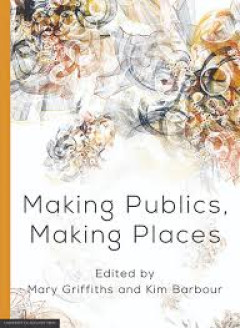
Making publics, making places
This book focuses on the surprising generative possibilities which digital and smart technologies offer media consumers, citizens, institutions and governments in making publics and places, across topics as diverse as Twitter audiences, rural news, the elasticity of the public sphere, Weibo, cultural heritage and responsive spaces in smart cities. Multidisciplinary perspectives engage with crit…
- Edisi
- -
- ISBN/ISSN
- 9781925261431
- Deskripsi Fisik
- xviii, 216p. : ill.
- Judul Seri
- -
- No. Panggil
- 307.76 MAK m
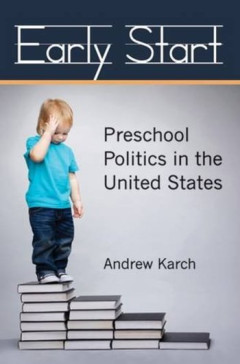
Early start :preschool politics in the United States
In the United States, preschool education is characterized by the dominance of a variegated private sector and patchy, uncoordinated oversight of the public sector. Tracing the history of the American debate over preschool education, Andrew Karch argues that the current state of decentralization and fragmentation is the consequence of a chain of reactions and counterreactions to policy decision…
- Edisi
- -
- ISBN/ISSN
- 9780472118724
- Deskripsi Fisik
- x, 274p. : ill.
- Judul Seri
- -
- No. Panggil
- 372.210973 KAR e

Environmental leadership capacity building in higher education :experience an…
The Graduate Program in Sustainability Science under the Department of Urban Engineering of The University of Tokyo has been running an environmental leadership education program at the graduate student level since 2007 called the Asian Program for Incubation of Environmental Leaders (APIEL). This book describes the University’s experiences in establishing and organizing that program and prov…
- Edisi
- -
- ISBN/ISSN
- 9784431543404
- Deskripsi Fisik
- xi, 140p. : ill.
- Judul Seri
- -
- No. Panggil
- 333.7072 ENV e
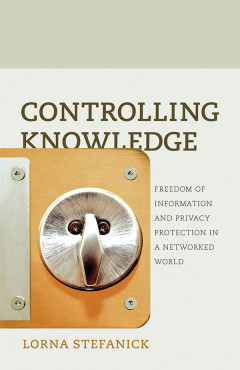
Controlling knowledge :freedom of information and privacy protection in a net…
Digital communications technology has immeasurably enhanced our capacity to store, retrieve, and exchange information. But who controls our access to information, and who decides what others have a right to know about us? In Controlling Knowledge, author Lorna Stefanick offers a thought-provoking and user-friendly overview of the regulatory regime that currently governs freedom of information a…
- Edisi
- -
- ISBN/ISSN
- 9781926836614
- Deskripsi Fisik
- xi, 251p. : ill.
- Judul Seri
- -
- No. Panggil
- 342.0853 STE c
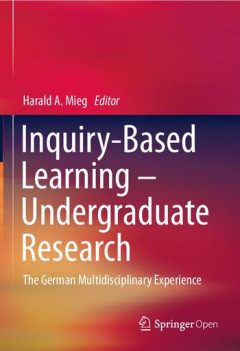
Inquiry-based learning -- undergraduate research :the German multidisciplinar…
This open access book provides a systematic overview of experiences with Inquiry-Based Learning (IBL) and undergraduate research (UR) in German universities, covering both research universities (Universitäten) and universities of applied sciences (Fachhochschulen). Divided into three parts, the book starts with the principles and common practices of IBL/UR at all universities. Part Two discuss…
- Edisi
- -
- ISBN/ISSN
- 9783030142230
- Deskripsi Fisik
- xvi, 406p. : ill.
- Judul Seri
- -
- No. Panggil
- 378 INQ i
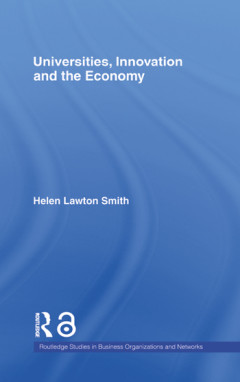
Universities, innovation and the economy
Universities are increasingly expected to be at the heart of networked structures contributing to society in meaningful and measurable ways through research, the teaching and development of experts, and knowledge innovation. While there is nothing new in universities’ links with industry, what is recent is their role as territorial actors. It is government policy in many countries that univer…
- Edisi
- -
- ISBN/ISSN
- 9781134344185
- Deskripsi Fisik
- xii, 265p. : ill.
- Judul Seri
- -
- No. Panggil
- 338.476200094 SMI u
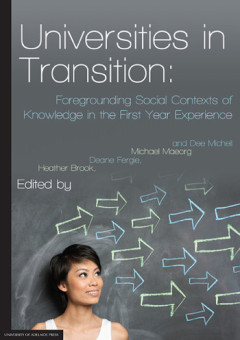
Universities in transition :foregrounding social contexts of knowledge in the…
Universities are social universes in their own right. They are the site of multiple, complex and diverse social relations, identities, communities, knowledges and practices. At the heart of this book are people enrolling at university for the first time and entering into the broad variety of social relations and contexts entailed in their ‘coming to know’ at, of and through university. By r…
- Edisi
- -
- ISBN/ISSN
- 9781922064837
- Deskripsi Fisik
- xi, 244p. : ill.
- Judul Seri
- -
- No. Panggil
- 378.1980994 UNI u

The social dynamics of open data
The Social Dynamics of Open Data is a collection of peer reviewed papers presented at the 2nd Open Data Research Symposium (ODRS) held in Madrid, Spain, on 5 October 2016. Research is critical to developing a more rigorous and fine-combed analysis not only of why open data is valuable, but how it is valuable and under what specific conditions. The objective of the Open Data Research Symposium a…
- Edisi
- -
- ISBN/ISSN
- 9781928331568
- Deskripsi Fisik
- viii, 200p. : ill.
- Judul Seri
- -
- No. Panggil
- 352.88 SOC s

Sharing knowledge, transforming societies :the Norhed Programme 2013-2020
"In June 2016, the Norwegian Programme for Capacity Development in Higher Education and Research for Development (Norhed) hosted a conference on the theme of ‘knowledge for development’ in an attempt to shift the focus of the programme towards its academic content. This book follows up on that event. The conference highlighted the usefulness of presenting the value of Norhed’s different p…
- Edisi
- -
- ISBN/ISSN
- 9781928502005
- Deskripsi Fisik
- xxxix, 570p. : ill.
- Judul Seri
- -
- No. Panggil
- 378.6 SHA s
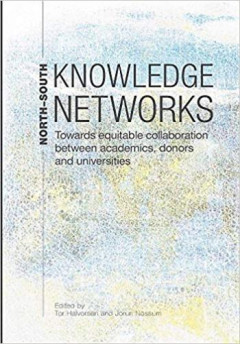
North-South knowledge networks :towards equitable collaboration between acade…
Since the 1990s, internationalisation has become key for institutions wishing to secure funding for higher education and research. For the academic community, this strategic shift has had many consequences. Priorities have changed and been influenced by new ways of thinking about universities, and of measuring their impact in relation to each other and to their social goals. Debates are ongoing…
- Edisi
- -
- ISBN/ISSN
- 9781928331308
- Deskripsi Fisik
- xv, 310p. : ill.
- Judul Seri
- -
- No. Panggil
- 378 NOR n

Open data in developing economies :toward building an evidence base on what w…
Recent years have witnessed considerable speculation about the potential of open data to bring about wide-scale transformation. The bulk of existing evidence about the impact of open data, however, focuses on high-income countries. Much less is known about open data’s role and value in low- and middle-income countries, and more generally about its possible contributions to economic and social…
- Edisi
- -
- ISBN/ISSN
- 9781928331599
- Deskripsi Fisik
- v, 275p. : ill.
- Judul Seri
- -
- No. Panggil
- 352.38091724 VER o

Knowledge for a sustainable world :a Southern African-Nordic contribution
The search for answers to the issue of global sustainability has become increasingly urgent. In the context of higher education, many universities and academics are seeking new insights that can shift our dependence on ways of living that rely on the exploitation of so many and the degradation of so much of our planet. This is the vision that drives SANORD and many of the researchers and instit…
- Edisi
- -
- ISBN/ISSN
- 9781928331049
- Deskripsi Fisik
- xi, 244p. : ill.
- Judul Seri
- -
- No. Panggil
- 338.96807 KNO k
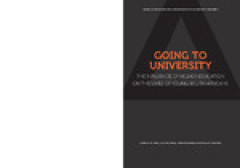
Going to university :the influence of higher education on the lives of young …
Around the world, more young people than ever before are attending university. Student numbers in South Africa have doubled since democracy and for many families, higher education is a route to a better future for their children. But alongside the overwhelming demand for higher education, questions about its purposes have intensified. Deliberations about the curriculum, culture and costing of p…
- Edisi
- -
- ISBN/ISSN
- 9781928331698
- Deskripsi Fisik
- ix, 164p. : ill.
- Judul Seri
- -
- No. Panggil
- 378.68 GOI g

The Politics of language contact in the Himalaya
- Edisi
- -
- ISBN/ISSN
- 9781783747078
- Deskripsi Fisik
- 200 p.; 23 cm.
- Judul Seri
- -
- No. Panggil
- 306.44 POL p
- Edisi
- -
- ISBN/ISSN
- 9781783747078
- Deskripsi Fisik
- 200 p.; 23 cm.
- Judul Seri
- -
- No. Panggil
- 306.44 POL p
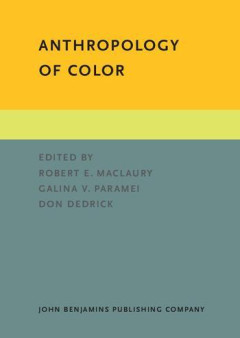
Anthropology of color :interdisciplinary multilevel modeling
The field of color categorization has always been intrinsically multi- and inter-disciplinary, since its beginnings in the nineteenth century. The main contribution of this book is to foster a new level of integration among different approaches to the anthropological study of color. The editors have put great effort into bringing together research from anthropology, linguistics, psychology, sem…
- Edisi
- -
- ISBN/ISSN
- 9789027291707
- Deskripsi Fisik
- xx, 485p. : ill.
- Judul Seri
- -
- No. Panggil
- 306.44 ANT a
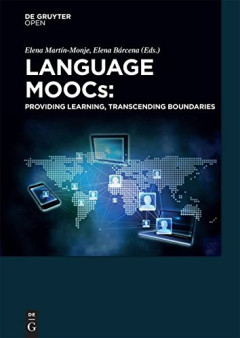
Language MOOCs :providing learning, transcending boundaries
Language MOOCs (or LMOOCs) are dedicated Web-based online courses for second languages with unrestricted access and potentially unlimited participation. They are generating interest and expectation in the contexts of university education, lifelong learning and online training in general. This pioneering book presents an initial analysis of the theoretical and methodological issues underlying LM…
- Edisi
- -
- ISBN/ISSN
- 9783110422504
- Deskripsi Fisik
- x, 175p. : ill.
- Judul Seri
- -
- No. Panggil
- 371.3344678 LAN l
 Karya Umum
Karya Umum  Filsafat
Filsafat  Agama
Agama  Ilmu-ilmu Sosial
Ilmu-ilmu Sosial  Bahasa
Bahasa  Ilmu-ilmu Murni
Ilmu-ilmu Murni  Ilmu-ilmu Terapan
Ilmu-ilmu Terapan  Kesenian, Hiburan, dan Olahraga
Kesenian, Hiburan, dan Olahraga  Kesusastraan
Kesusastraan  Geografi dan Sejarah
Geografi dan Sejarah